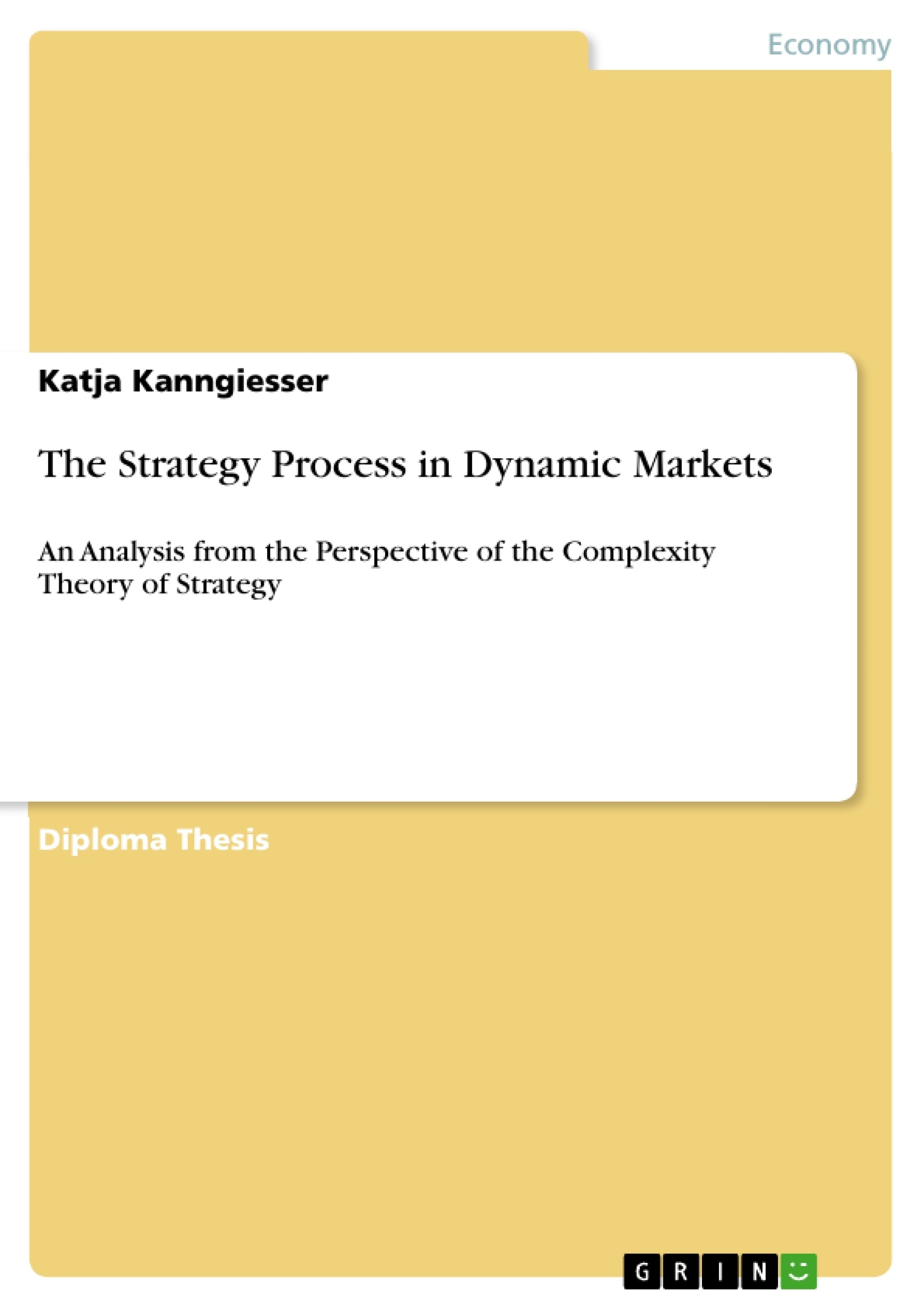
The Strategy Process in Dynamic Markets
Diplomarbeit, 2006
74 Seiten, Note: 1,7
Leseprobe
Inhaltsverzeichnis (Table of Contents)
- Introduction
- Background and objectives
- Outline and structure of the paper
- Strategic paradigms
- Traditional approaches to strategy
- Strategic positioning
- The resource-based view
- Complexity theory of strategy
- Austrian economics
- Dynamic capabilities
- Complexity theory
- Market dynamism
- Determinants for market dynamism
- Necessity of considering market dynamism
- Strategy process in non-dynamic markets
- General characteristics
- Steps
- Critics of the classical process model and deficiencies in dynamic markets
- Contributions from the complexity theory of strategy to the strategy process in dynamic markets
- Austrian economics
- Dynamic capabilities
- Complexity theory
- Design of a new framework for strategy creation
- Setting
- Content
- Coordination within system two
- Internal control and optimization within system three
- Innovation and adaptation within system four
- Simple rules within system five
- Comparison of the new framework with the classical process
- Check for validity in dynamic markets
Zielsetzung und Themenschwerpunkte (Objectives and Key Themes)
This paper examines the strategy process in dynamic markets from the perspective of the complexity theory of strategy. It aims to analyze how the characteristics of dynamic markets challenge traditional approaches to strategy and explore alternative frameworks that are better suited to managing complexity and uncertainty.
- Traditional strategic paradigms and their limitations in dynamic markets
- The complexity theory of strategy as a framework for understanding and managing dynamic markets
- The impact of market dynamism on the strategy process
- Developing a new framework for strategy creation in dynamic markets
- Comparing the new framework with traditional process models
Zusammenfassung der Kapitel (Chapter Summaries)
The first chapter introduces the background and objectives of the research, outlining the paper's structure and scope. Chapter two presents a comparative analysis of traditional strategic paradigms, including strategic positioning and the resource-based view, alongside the complexity theory of strategy. The chapter delves into the key elements of the complexity theory, exploring its origins in Austrian economics and its connection to dynamic capabilities and complexity theory research.
Chapter three discusses the characteristics of dynamic markets and their impact on organizations, highlighting the necessity of considering market dynamism in strategic decision-making. Chapter four examines the strategy process in non-dynamic markets, analyzing its general characteristics, steps, and limitations when applied to dynamic environments.
Chapter five explores the contributions of the complexity theory of strategy to the strategy process in dynamic markets, analyzing the insights provided by Austrian economics, dynamic capabilities research, and complexity theory itself. Chapter six delves into the design of a new framework for strategy creation based on the principles of the complexity theory of strategy, detailing its structure, content, and validation in dynamic market contexts.
Schlüsselwörter (Keywords)
Key concepts explored in this paper include strategic paradigms, complexity theory of strategy, dynamic markets, market dynamism, strategy process, Austrian economics, dynamic capabilities, and a new framework for strategy creation. The paper draws upon research in various fields, including economics, management, and complexity science, to analyze the challenges and opportunities of managing strategy in complex and dynamic environments.
Frequently Asked Questions
What is the "Complexity Theory of Strategy"?
It is a strategic framework that combines insights from Austrian economics, the dynamic capabilities view, and complexity theory to manage businesses in rapidly changing markets.
Why do traditional strategy models fail in dynamic markets?
Traditional models like strategic positioning are often too rigid and sequenced, making them unable to keep pace with the surprising and fleeting opportunities of dynamic environments.
What are "simple rules" in strategic management?
Simple rules are flexible guidelines that help managers improvise and react quickly to environmental changes without being bogged down by complex bureaucracy.
How does Austrian economics contribute to this theory?
Austrian economics views markets as a flow of heterogeneous opportunities that require constant alertness and capturing by strategic managers.
Is there a step-by-step process for strategy in dynamic markets?
No, the paper concludes that a sequenced process is too slow. Instead, it proposes a loose framework for continuous innovation and adaptation.
Details
- Titel
- The Strategy Process in Dynamic Markets
- Untertitel
- An Analysis from the Perspective of the Complexity Theory of Strategy
- Note
- 1,7
- Autor
- Katja Kanngiesser (Autor:in)
- Erscheinungsjahr
- 2006
- Seiten
- 74
- Katalognummer
- V83652
- ISBN (eBook)
- 9783638872881
- Dateigröße
- 727 KB
- Sprache
- Englisch
- Schlagworte
- Strategy Process Dynamic Markets Analysis Perspective Complexity Theory Strategy
- Produktsicherheit
- GRIN Publishing GmbH
- Preis (Ebook)
- US$ 31,99
- Arbeit zitieren
- Katja Kanngiesser (Autor:in), 2006, The Strategy Process in Dynamic Markets, München, Page::Imprint:: GRINVerlagOHG, https://www.diplomarbeiten24.de/document/83652
- Autor werden
- Ihre Optionen
- Vertriebskanäle
- Premium Services
- Autorenprofil
- Textarten und Formate
- Services für Verlage, Hochschulen, Unternehmen

- © GRIN Publishing GmbH.
- Alle Inhalte urheberrechtlich geschützt. Kopieren und verbreiten untersagt.
- info@grin.com
- AGB
- Open Publishing
Der GRIN Verlag hat sich seit 1998 auf die Veröffentlichung akademischer eBooks und Bücher spezialisiert. Der GRIN Verlag steht damit als erstes Unternehmen für User Generated Quality Content. Die Verlagsseiten GRIN.com, Hausarbeiten.de und Diplomarbeiten24 bieten für Hochschullehrer, Absolventen und Studenten die ideale Plattform, wissenschaftliche Texte wie Hausarbeiten, Referate, Bachelorarbeiten, Masterarbeiten, Diplomarbeiten, Dissertationen und wissenschaftliche Aufsätze einem breiten Publikum zu präsentieren.
Kostenfreie Veröffentlichung: Hausarbeit, Bachelorarbeit, Diplomarbeit, Dissertation, Masterarbeit, Interpretation oder Referat jetzt veröffentlichen!
- GRIN Verlag GmbH
-
- Nymphenburger Str. 86
- 80636
- Munich, Deutschland
- +49 89-550559-0
- +49 89-550559-10
- info@grin.com
-









